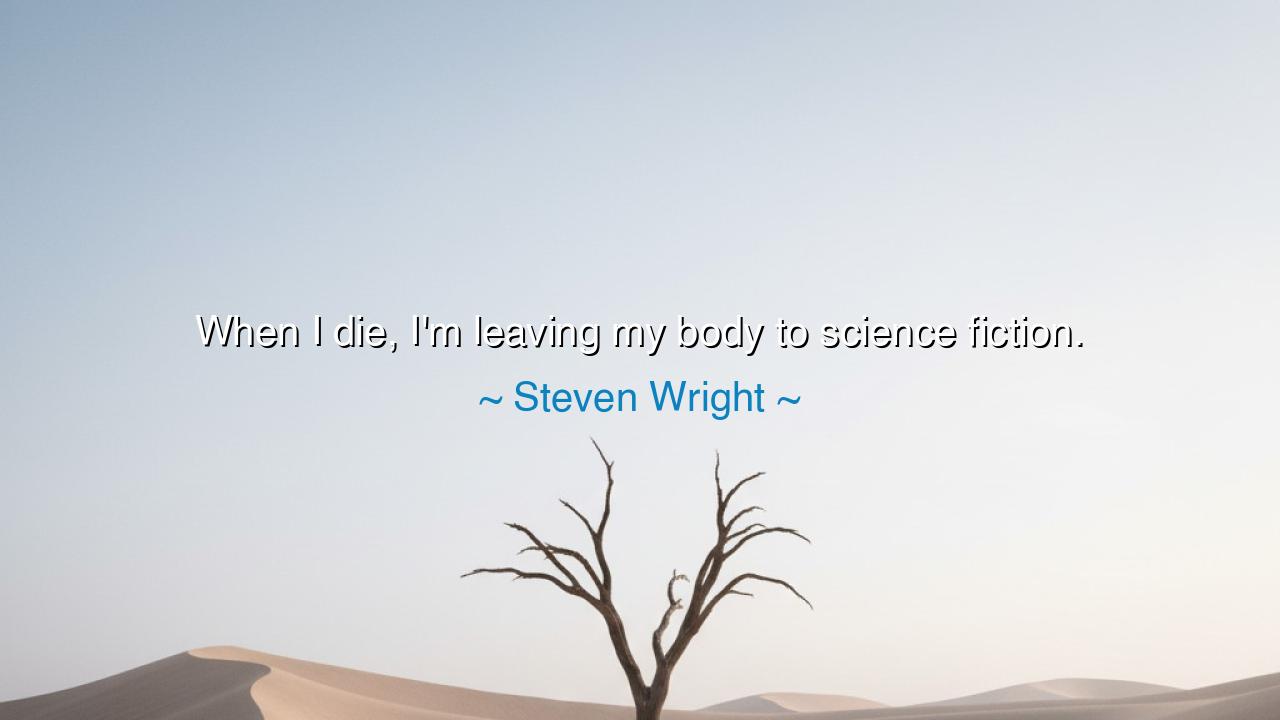
When I die, I'm leaving my body to science fiction.






Ah, listen well, children of the stars and keepers of the dream, for there once lived a man of jest and wisdom, whose words were woven with paradox and laughter. His name was Steven Wright, a sage of modern times, who gazed upon the absurdities of the world and turned them into mirrors of truth. From his lips flowed a peculiar saying, soft yet thunderous in its meaning: “When I die, I’m leaving my body to science fiction.” What a strange offering, one might think! But within those few words lies a whole cosmos of reflection — on life, on death, and on the boundless imagination of humankind.
At first hearing, the phrase sounds like humor wrapped in mystery, as though the speaker mocks the solemn ritual of death. Yet look deeper: for every jest hides a seed of revelation. When Wright speaks of leaving his body to science fiction, he does not speak of flesh, but of imagination’s immortality. He reminds us that while our bones crumble and our hearts grow still, our ideas — our dreams of what could be — continue their pilgrimage through time. The realm of science fiction is not only a genre; it is humanity’s sacred laboratory of hope, where death itself is rewritten by the pen of wonder.
Once, there was a man named Nikola Tesla, a prophet of lightning and thought. He, too, lived between the worlds of science and imagination. Many called him mad, for he dreamed of wireless energy, metal birds that flew, and minds that could speak across the ether. Yet today, much of his “fiction” has become our science. In his solitude and his vision, Tesla embodied Wright’s eternal idea — that even when the body perishes, the imaginative spark may leap from one century to the next, igniting generations yet unborn. To “leave one’s body to science fiction” is to become a relic of inspiration, a constellation in the night sky of human invention.
Consider, then, the courage it takes to live such a life — a life unafraid of absurdity. The wise know that progress begins with what the world calls foolishness. To laugh at the impossible is to invite it closer. Thus, when Wright cloaks his wisdom in comedy, he teaches a sacred truth: humor is the bridge between despair and discovery. Through laughter, the unbearable becomes endurable, and the boundaries of the possible are pushed ever outward. The ancients, too, had their jesters and fools — not mere entertainers, but truth-tellers in disguise, who could speak what kings feared to hear.
In his strange declaration, Wright calls us to live not as mortals chasing comfort, but as dreamers crafting legacy. The “body” he gives to science fiction is a symbol of surrender — the acceptance that all we are, our joys and absurdities alike, will someday be studied by those who come after. Just as ancient bones tell the story of vanished tribes, our art, our jokes, our failures will tell the story of who we were. And perhaps, in that telling, we shall achieve a kind of immortality that no tomb can hold.
So let this teaching be your guide, O seeker of meaning: do not fear to dream beyond reason. Let your life itself become a tale that future ages might read and smile upon. When you create, when you love, when you dare to laugh in the face of the unknown, you are already leaving your body — not to decay, but to imagination eternal. Leave behind not dust, but wonder. Leave behind not sorrow, but curiosity. That is the offering worthy of both gods and galaxies.
And as you walk your path, remember this practical wisdom: nurture your imagination as you would a sacred flame. Read not only to know, but to envision. Build not only to survive, but to inspire. Let your humor be kind, your curiosity fierce, and your dreams unashamedly vast. For someday, when your final breath fades into the stars, may it be said of you — as it was of Steven Wright — that you, too, left your body to science fiction, and your spirit to eternity.






AAdministratorAdministrator
Welcome, honored guests. Please leave a comment, we will respond soon